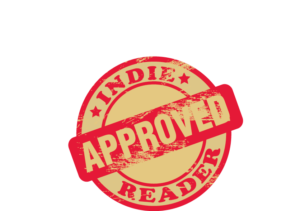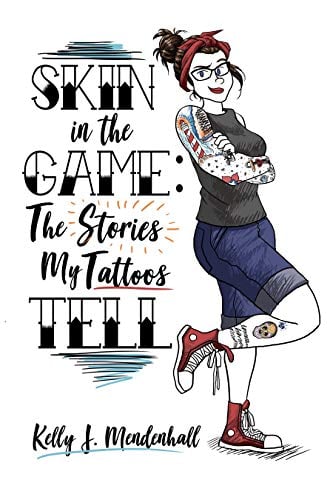
Skin in the Game: The Stories My Tattoos Tell received a 4+ star review, making it an IndieReader Approved title.
Following find an interview with author Kelly Mendenhall.
What is the name of the book, and when was it published?
Skin in the Game: The Stories My Tattoos Tell, Released on June 1, 2019.
What’s the book’s first line?
The first line of Introduction: I got my first tattoo when I was 17 years old. The first line of Chapter 1: Survival, love, and friendship. ‘That’s the story my first tattoo tells.
What’s the book about? Give us the “pitch.”
Skin in the Game: The Stories My Tattoos Tell is a book about survival, human connection, false steps, and ascension. It’s a book about what it means to be a survivor, and not just to survive but thrive against high odds and significant obstacles. Unlike most memoirs, the text does not follow a chronological pattern in the traditional sense, but rather the vital pieces of the author’s life story are told through the stories behind her eclectic collection of tattoos in the order in which she got acquired the artwork. Photos of the tattoos accompany the text in each chapter.
What inspired you to write the book? A particular person? An event?
I became suddenly medically disabled and lost my mobility in June of 2017. I went from being a person with regular aches and pains and a “bad back” to being unable to walk; I could only shuffle my feet a few inches at a time, and the pain was other-worldly. The neuromuscular and skeletal defects and issues in my spine remained a mystery, and I was immobile for about ten months.
Meanwhile, I was fighting against doctors who refused to believe that I knew my body better than they did. My symptoms were real, but evidence of the cause was not showing up on any of my scans or x-rays. It took until December 2017 before I found a pain management doctor who believed me and told me that my pain was real, and he knew that I wasn’t crazy or lying.
It wasn’t until June of 2019 that the mystery was finally solved, I had two ruptures in my spine, in the parts of my spine doctors had refused to check before. One is an incredibly rare rupture at the junction between to Thoracic and Lumbar spines and requires a very difficult, unique, and complicated surgical fix. Somewhere in the early part of my medical journey, I decided that I was going to turn a mess into a message. The more that doctors fought me, the harder I worked at finding the right doctors, and the more openly I shared my story and journey through my blog, on social media, and, eventually, my book.
I’ve come what I call a Radical Self-Care advocate, as well as an advocate for women living with chronic pain and illness, working to raise awareness about Medical Gaslighting and the bias against women reporting pain and chronic symptoms in the medical world. It’s a well-documented bias that is killing women every day and causing others to become permanently medically disabled. I am currently working on my second book focused on this topic.
What’s the main reason someone should really read this book?
I would say that anyone needing inspiration should read this book, especially, maybe, young adults. I open up about sexual abuse and trauma, physical abuse, grief, and loss throughout my life, my abortion at the age of 28, as well as my healing journey through recent years. The main message is, I think, to never give up. That a single event, trauma, mistake, diagnosis, or set of diagnoses do not have to be the end of a person’s story. We are all the heroes of our own stories, and everyone loves a hero.
When did you first decide to become an author?
I was 7 years old when I begged my mother for a typewriter for my 8th birthday, and she came through. I loved reading, books were a way to escape my surroundings and find peace amidst my imagination. I think I knew when I begged for that typewriter that I wanted to grow up and be a famous writer. I even started practicing my autograph in 8th grade. For a long time, though, I got lost in survival mode and in doing what I thought I was “supposed” to do to be “successful.” It took my body falling apart and not being able to run away from myself or my dreams anymore before I finally started to realize them.
Is this the first book you’ve written?
It is, but I am already working on Book No. 2. The working title is Medical Gaslighting: Tales of Women Surviving the Bias.
What do you do for work when you’re not writing?
I’m medically disabled and unable to work outside the home, but I have found several ways to keep myself busy. Sometimes I write opinion columns as a freelance journalist; I also do freelance proofreading and editing work. I started a podcast with my best friend in July of 2018, and it’s begun to gain some serious traction lately, I hope to continue to have more corporate sponsors come on and use the podcast as a revenue stream as well.
Finally, I’m a network marketer and work as an independent skincare consultant. “Network Marketing” has a stigma attached to it because, for a long time, people were trained to utilize some really gross tactics for gaining sales and clients, as well as business partners. I don’t play those old games, and I’m out to show folks that you can be a network marketer and generate revenue from your couch (especially if you’re like me and have limited mobility) without gross business practices and chasing off all your friends and family.
How much time do you generally spend on your writing?
I try to write every day, 30 minutes a day, whether it’s blogging or working on a book, content creation for social media, or something else.
What’s the best and the hardest part of being an indie?
For me, the hardest part is that because of my limited mobility. I can’t go out into the world and make connections and form relationships on traditional terms. I have to do a lot of my outreach and marketing from the couch or bed. But I think sometimes people respect me more when they learn my story and see how determined I am to be a successful indie author in the face of all that I am up against medically.
What’s a great piece of advice that you can share with fellow indie authors?
Just write. If you love to write, do it. Own that you are a writer. Don’t think that because you aren’t published yet or because you haven’t had a major book deal that you aren’t an author/writer. You are the craft you practice, and you define who, and what you are, no one else should be allowed to define that for you.
Would you go traditional if a publisher came calling? If so, why?
For the right publisher and with the right contract, absolutely. Again, it’s harder for me to handle the marketing and publicity side of things from home. I would love to have help with the marketing and PR side of being an author.
Is there something in particular that motivates you (fame? fortune?)
I am a natural-born advocate and activist, and I am no longer able to march, protest, or fight the powers that be in a literal sense. My pen is my sword now. My words have to be my actions of rebellion and revolution.
Which writer, living or dead, do you most admire?
Dave Eggers. He’s one of my favorite authors, but he’s also just a genuinely great guy. Some people say that fame can turn a person evil. I don’t think that’s true. I think that fame can help to enhance whoever you really are deep down inside. And if you are a person with compassion and empathy who cares about other people and wants to contribute to your community, then fame will only allow you to do that even more and better.
